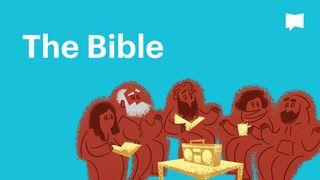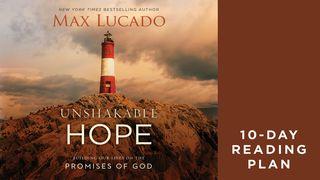The Bible with Nicky and Pippa Gumbel, Classic Version, 2017Sample

How to Stay on Track
Pippa and I love to go for long walks (or rather, I like to go for long walks and she likes to go for slightly shorter walks – so we compromise with medium length walks!). Not so long ago, we went for a reasonably long walk on the South Downs. Neither of us has a very good sense of direction and we had forgotten to take the map. Somehow we managed to wander off the track and we ended up on someone’s farm.
It was one of the shortest days of the year and soon the light started to fade. It seemed that the only way to get back to where we had parked the car was to cross a field occupied by a large herd of cows. As we approached them, some surrounded us in an overly friendly fashion, blocking our way, while others took off in fright and started charging around the field.
We were convinced that we were going to be mown down into the mud by the pursuing cattle, or taken to task by an irate farmer for causing the terrified cows to charge into the fencing. We decided to make a rather speedy exit up a very steep and slippery bank. Pippa had exceeded her desired length of walk, darkness was falling and we seemed to be nowhere near a track. Things were not looking good.
Thankfully, we managed to find a track leading us back. It was such a relief. For future walks we decided we would definitely take a map and stick to the tracks. Staying on the track proves much better for being able to relax, talk together and for our relationship generally!
In the Bible, the image of God’s tracks is frequently used: tracks that lead to life.
Psalm 17:1-5
1. Determine to stay on God’s tracks
David says, ‘My steps have held closely to Your paths [to the tracks of the One Who has gone on before]’ (v.5a, AMP). The Hebrew word for paths literally means ‘wheel-tracks’. David is absolutely determined to stay on God’s tracks. In order to stay on God’s tracks you need to watch:
- Your heart (what you think about)
‘Though you probe my heart, though you examine me at night and test me, you will find that I have planned no evil’ (v.3a).
- Your words (what you say)
‘I have resolved that my mouth will not sin’ (v.3c).
- Your feet (the places that you go)
‘My feet have not slipped’ (v.5b).
Lord, help me to stay on your tracks. May my feet not slip. Help me to guard my thoughts day and night. Help me not to sin against you through anything I say or do.
Matthew 19:1-15
2. Stay on God’s tracks in your relationships
Jesus’ teaching on relationships is of vital importance for your own life and for society. In this passage, he sets out God’s tracks for family life.
- Importance of marriage
The Pharisees ask Jesus about divorce, but he replies by speaking about marriage. He goes back to the creation account. Jesus quotes from Genesis 2:24, stating that, ‘For this reason a man will leave his father and mother and be united to his wife, and the two will become one flesh’ (Matthew 19:5). This verse from Genesis is seen as the blueprint verse for marriage – not only in the Old Testament and by Paul (Ephesians 5:31) but also by Jesus himself.
Marriage involves the public act of making a lifelong commitment to your partner that takes priority even over your parental relationships. It involves being ‘united’ with one’s partner – the Hebrew word means literally ‘glued’ together – not just physically and biologically but emotionally, psychologically, socially and spiritually. This is the Christian context of the ‘one-flesh’ union. The biblical doctrine of marriage is the most exciting and positive one that exists. It is also the most romantic view. It sets before us God’s perfect plan.
- Concession of divorce
The Pharisees persist with their questions about divorce. They speak of Moses’ command (Matthew 19:7). Jesus replies by saying Moses permitted it ‘because your hearts were hard’ (v.8) and robustly confronts those men who (in a society in which women had far fewer rights) used the provision of the law to walk away from their wives (v.9).
Moses’ provision for divorce reminds us of God’s grace and compassion in situations where we fall short of his ideals. But Jesus is saying that divorce is never ideal.
Many of those who have experienced the pain of a broken marriage will identify with Job’s description of his suffering in today’s Old Testament passage. We need to do all we can to guard marriages (ours and others) and do all we can to comfort those who have been divorced (not by casting blame like Eliphaz).
- Calling to singleness
Jesus speaks of three types of singleness. First, genetic – ‘they were born that way’ (v.12a) and ‘never give marriage a thought’ (MSG). Second, there is involuntary singleness (v.12b) – those who ‘never get asked – or accepted’ (MSG). Third, there is voluntary singleness – those who ‘decide not to get married for kingdom reasons’ (v.12c, MSG). Singleness can be temporary or permanent, but it is never regarded in the New Testament as second best. Both marriage and singleness are high callings and, according to the New Testament, there are advantages and disadvantages to both.
- Priority of children
The words of Jesus challenged the attitude of many of his contemporaries towards children. In ancient societies children were often kept on the periphery of society – to use an old-fashioned British saying, they were to be ‘seen but not heard’.
God’s tracks are very different. Jesus places his hands on the little children and prays for them (v.13a). When the disciples feel that Jesus should not be distracted by them, Jesus replies, ‘Let the little children come to me, and do not hinder them, for the kingdom of heaven belongs to such as these’ (v.14). He demonstrates the high priority children should have in our lives.
As parents it is very important to prioritise our children and not to see them as distracting us from our work or ministry. As a church, we need to see that our children and youth have priority in terms of resources and facilities because the kingdom of heaven belongs to them as much as anyone else.
Lord, help us both in our own personal lives and as a society not to wander off your tracks for family life. I pray for your blessing on all those working to strengthen family life.
Job 4:1-7:21
3. Help others stay on God’s tracks
I am so thankful for my friends who have helped me stay on track. However, sometimes it is possible even for our friends to misunderstand or get things wrong. In this passage we see a contrast between Job who helped others stay on God’s tracks (4:3–4) and Eliphaz who was ‘no help’ to Job (6:21).
Sometimes people ask, ‘Is every word in the Bible true?’ My reply is always, ‘Yes, but like every other book it needs to be interpreted.’ One of the rules of interpretation is that we have to interpret according to the context.
In this passage today we read the words of Eliphaz, one of Job’s ‘friends’. We have to read these words in the light of the fact that in the end, the Lord says to Eliphaz the Temanite, ‘I am angry with you and your two friends, because you have not spoken the truth about me, as my servant Job has’ (42:7). The words that we read in this passage are not all true. Job’s friends give far too simplistic an answer to the issue of suffering. Their diagnosis is often naïve, pious and unrealistic.
Job, on the other hand, is realistic and honest as he struggles with pain, sleepless nights, grief and suffering. His suffering is not as a result of his own sin as Eliphaz and his friends suggest. Job rightly asks, ‘Show me where I have been wrong’ (6:24). God’s Spirit will always convict us of specific sins whereas Eliphaz and his friends say to him in effect, ‘You must have done something wrong to be suffering like this.’ Those who are suffering have not necessarily caused their suffering by their own sin. If we have, then God will convict us and show us the specific sin.
Eliphaz and his friends give advice that is a mixture of truth and falsehood and their words need to be interpreted as such. One thing Eliphaz says that is probably true is that Job was a man who helped people stay on God’s tracks: ‘Think how you have instructed many, how you have strengthened feeble hands. Your words have supported those who stumbled; you have strengthened faltering knees’ (4:3–4).
Your task is not just to stay on track yourself but, like Job, to help others as well by your actions and by your words.
Lord, thank you for all my friends who help me stay on track. Help me to be a genuine comfort to those who are suffering, to support those who stumble and strengthen those with faltering knees. Help us all to help each other to walk in your ways and stay on your tracks.
Pippa Adds
I am impressed by the psalmist saying, ‘... my mouth has not transgressed’ (17:3c). It means being careful about all your words. What we say when we are ‘off duty’ still really matters.
About this Plan

Start your day with the Bible in One Year, a Bible reading app with commentary by Nicky and Pippa Gumbel. Nicky Gumbel is the Vicar of HTB in London and pioneer of Alpha. 'My favourite way to start the day.' - Bear Grylls, Adventurer
More
We would like to thank Nicky and Pippa Gumbel, HTB for providing this plan. For more information, please visit: https://www.bibleinoneyear.org/
Related Plans

The One Year® Chronological Bible

ICA - 365 Daily Kingdom Living

The Greatest Gift

C.S. Lewis And The Call To Create

BibleProject | The Bible

Choosing Each Day: God or Self?

Discerning The Voice Of God

Through My Father's Eyes

Unshakable Hope: Building Our Lives On The Promises Of God
